Right around this time last year, I wrote an article on the top eight NFL teams of the 1970s, but I didn’t go into a lot of detail, so this year, I decided to take a closer look at these teams and give a little rundown of how they did season by season.
I have eliminated team #8, the Baltimore Colts, because there is a significant drop-off between the Colts and the # 7 team, the Washington Redskins. This will be a seven-part podcast, starting with team #7 and working down to number one.
1st Half of the Decade
The decade didn’t start too well for the Washington Redskins. Coach Vince Lombardi, who led the team to its first winning season since 1955, died of cancer shortly before the start of the 1970 season.
His replacement Bill Austin didn’t fair well as the team reverted to its losing ways, finishing the season at 6–8. Two bright spots for the team were center Len Hauss and running back Larry Brown, who made the Pro Bowl. Brown led the NFC in rushing yards with 1,125 and was named first-team All-Pro.
The 1971 season started with a new Head Coach, George Allen, and a new quarterback, Billy Kilmer, who replaced the injured Sonny Jurgensen. After five weeks, the Redskins were 5–0. They lost to the Chiefs in week six, and star receiver Charley Taylor was lost for the season with a broken leg. The team rebounded to win four of their next eight games to finish the season with a 9–4–1 record.
Although they lost their playoff game to the SF 49ers 24–20, the future looked bright. Running back Larry Brown was again chosen to play in the Pro Bowl. WR Roy Jefferson, Kicker Curt Knight, and return man Speedy Duncan joined him. George Allen won the Coach of the Year Award.
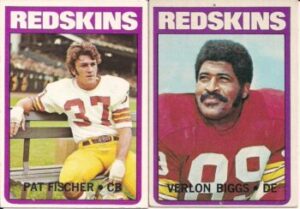
By the beginning of the 1972 season, the media started calling the Redskins “ The Over the Hill Gang” since so many of their players were over thirty yrs old. A mid-season quarterback controversy ended when Sonny Jurgensen tore his Achilles tendon and was lost for the remainder of the season.
Many people criticized Coach Allen for trading away future draft picks in favor of veteran players, but it was hard to argue with the results. After twelve weeks, Washington had the best record in the NFC, losing only once. Washington lost its last two regular season games, but their 11–3 record was still the best in the NFC.
The Skins made short work of the Packers in the playoff game, winning 16–3. Still, some questioned if the team was really that good. The Redskins answered that question with a resounding 26–3 victory over the defending Super Bowl Champion Dallas Cowboys in the NFC Championship. It was on to Los Angeles to meet the undefeated Miami Dolphins in the Super Bowl.
Washington came up short in that game, losing a tough-fought defensive battle 14–7. But it had been a great season, and Redskins fans looked forward to 1973. Running Back Larry Brown won the NFL MVP award. Brown and linebacker Chris Hanburger were 1st team All-Pro and Pro Bowl selections. Receiver Charley Taylor and quarterback Billy Kilmer also made the Pro Bowl team.

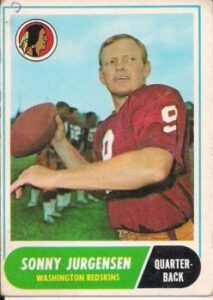
Jurgensen was injury free in 1973 but started only four games, as Coach Allen favored Billy Kilmer at quarterback. After six weeks of play, Washington lost only one game but then lost two in a row. They rebounded to finish the season at 10–4. With high hopes, they traveled to Minnesota for a playoff game against the Vikings but lost a hard-fought battle 27–20. Linebacker Chris Hanberger made All-Pro for the second year in a row.
He also made the Pro Bowl team, along with receiver Charley Taylor, return man Herb Mul-Key, and strong safety Ken Houston.
At the midway point of the 1974 season, The Redskins record was a very average 4–3, but they won six of their next seven to finish the season with a 10–4 record. They traveled to LA to face the Rams in the playoffs and lost 19–10. Charley Taylor, Ken Houston, Chris Hanburger, and defensive tackle Diron Talbert were selected for the Pro Bowl.
Washington started the 1975 season by outscoring their first two opponents 90 to 16, but they came crashing back to earth with a 26–10 loss to the Eagles in week three. After twelve weeks, the team’s record was 8–4, with a chance of making the playoffs, but they ultimately fell apart in their last two games, losing 31–10 to the Cowboys and 26–3 to the Eagles.
Chris Hanburger, Ken Houston, and Charley Taylor made the Pro Bowl, and Hanburger and Houston were also named All-Pro.
2nd Half of the Decade
With Sonny Jurgensen now retired, a new quarterback controversy arose between the 37-year-old Billy Kilmer and the 27-year-old Joe Theismann. The 1976 Redskins stood at 8–4 after week twelve, the same record they had in 1975.
But this year, instead of losing their final two games, they won their last two games and were on their way to Minnesota to face the Vikings in the playoffs. Washington was never in the game, trailing 35–6 in the fourth quarter. They scored two meaningless touchdowns in the fourth quarter to make the final 35–20. Chris Hanburger and Ken Houston once again made the Pro Bowl, along with running back Mike Thomas and defensive back Eddie Brown.
The 1977 Redskins were 6–5 after week eleven, but they rallied to win their final three games. Their 9–5 record put them in a tie with the Chicago Bears for the Wild-Card spot in the playoffs, but they lost the tie-breaker, and their season was over. Tight end Jean Fugett, defensive back Eddie Brown, and Ken Houston made the Pro Bowl.
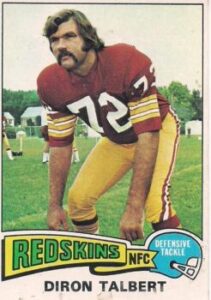
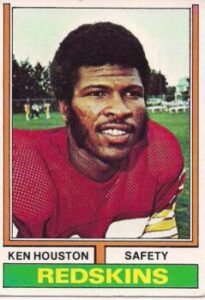
Roughly one month later, Coach George Allen was dismissed. Some favored the decision citing that Allen had traded away the team’s future draft picks and that they were 2–5 in post-season play. Others protested, pointing out the team’s 69–35–1 overall record and the fact that they won the NFC Championship in 1972, their first Championship in 30 years.
Allen’s replacement was Jack Pardee, who played linebacker for Allen, first with the Rams and later with the Redskins. It looked like management made the right decision when the team started 6–0, with Joe Theismann now the established starting quarterback. But the team lost eight of their next ten games; It was the team’s first non-winning season since 1970. Return man Tony Green made the Pro Bowl, as did Ken Houston, who also made All-Pro.
The 1979 Redskins were 6–2 at the midway point but won only four of their next eight. They had a chance to win their division in the season’s final game but blew two big leads to the Cowboys and a chance to qualify for the playoffs. Kicker Mark Mosely made the Pro Bowl, along with defensive backs Joe Lavender, Ken Houston, and Lamar Parrish, who also made All-Pro.
The bottom line. Regular season record 91–52–1. Post-season record 2–5. Division titles — one. NFC titles — one. Superbowl titles — zero.
Mark Morthier is the host of Yesterday’s Sports, a podcast dedicated to reliving memorable sports moments from his childhood days and beyond. He grew up in New Jersey just across from New York City, so many of his episodes revolve around the great sport’s teams of the 70s for the New York area.
He is also an author of No Nonsense, Old School Weight Training (Second Edition): A Guide for People with Limited Time and Running Wild: (Growing Up in the 1970s)
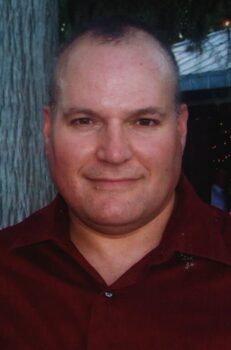
Please Note – As an Amazon Associate I earn from qualifying purchases
More From Yesterday's Sports
1972 Olympics Revisited (Weightlifting Medal Winners)
Weightlifting at the 1972 Olympics occurred in Munich, Germany, from...
Read More1968 Olympics Revisited (Weightlifting Medal Winners)
The 1968 Olympics were held in Mexico City in October....
Read More1968 Detroit Tigers (A Historic Championship Season)
With baseball season in full swing, I thought I’d take...
Read More(4 All-Time Weightlifting Greats) Paul Anderson, Tommy Kono, Ken Patera, and Naim Süleymanoğlu
Here’s a quick look at some of the accomplishments of...
Read More


